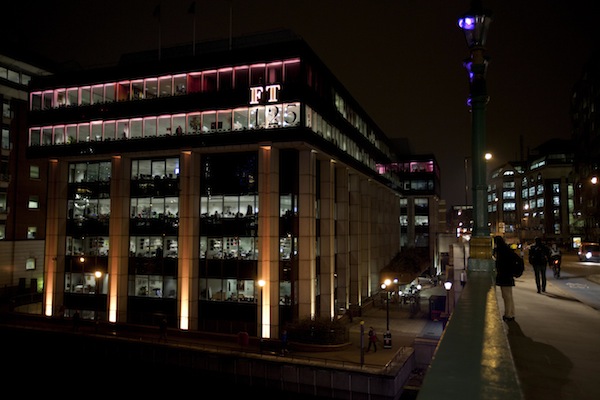
With Pearson planning to be “completely and absolutely focused on education,” Fallon and Financial Times CEO John Ridding stressed, the $1.3 billion sale made sense.
The Financial Times, which Pearson acquired 58 years ago, has been a major digital success story, providing evidence that a metered paywall model can work. The paper’s combined print and digital circulation is now 737,000, up more than 30 percent over the last five years — with digital subscribers making up 70 percent of the total paying audience. Mobile drives almost half of the FT’s traffic, and as of earlier this year, 20 percent of new subscriptions took place on smartphones. Fallon wrote in a blog post on Pearson’s site:We are at an inflection point in global media. The pace of disruptive change in new technology — in particular, the explosive growth of mobile and social media — poses a direct challenge to how the FT produces and sells its journalism. It presents the FT with a great opportunity too — to reach more readers than ever before, in new and exciting ways.
Nikkei has a long and distinguished track record of quality, impartiality and reliability in its journalism and global viewpoint. The Board and I are confident that the FT will continue to flourish under Nikkei’s ownership.
I’ve every confidence in the FT’s ability to seize the moment, as it has done ably so far, in its digital transformation. The readership is at an all time high, with readers willing to pay more than ever for its journalism. But, after much reflection and detailed analysis of both the opportunities and challenges that lie ahead, we have concluded that the best way to ensure the FT’s continuing journalistic and commercial success is for it to be part of a global, digital news organization that is 100 percent focused on these same issues.
“Our motto of providing high-quality reporting on economic and other news, while maintaining fairness and impartiality, is very close to that of the FT,” Tsuneo Kita, chairman and group CEO of Nikkei, said in a statement. “We share the same journalistic values.” On the call, Ridding stressed that the FT will retain editorial independence: “I’m absolutely confident that they really walk the talk of editorial independence…We’ve been very clear about that.”
And suddenly Nikkei owner Tsuneo Kita becomes one of most powerful businesspeople in the West. But good luck finding a good profile of him.
— Josh Halliday (@JoshHalliday) July 23, 2015
One reporter asked how the FT will “maintain that Britishness.”
“I hope it doesn’t sound like I’m boasting or being arrogant when I say this, but Pearson has been an absolutely pristine proprietor of the FT,” Fallon said. “It’s implicit in the culture and the fabric and the whole way in which the organization operates…I think anyone who spends any time understanding more about Nikkei would find that, in its cultural approach and respect for the cultural independence and integrity [of the FT], it is the same.”
In 1987 Pearson sold the FT's building to a Japanese buyer and kept the paper. Now it's selling the paper and keeping the building. Discuss.
— Peter Thal Larsen (@peter_tl) July 23, 2015
Pearson retains a 50 percent stake in The Economist and a 47 percent stake in Penguin Random House, the world’s largest book publisher, but “we are not leading the day-to-day management of those companies,” Fallon said. “In terms of the businesses that we actively manage and lead on a daily basis, everything in that category will now be 100 percent related to education.”